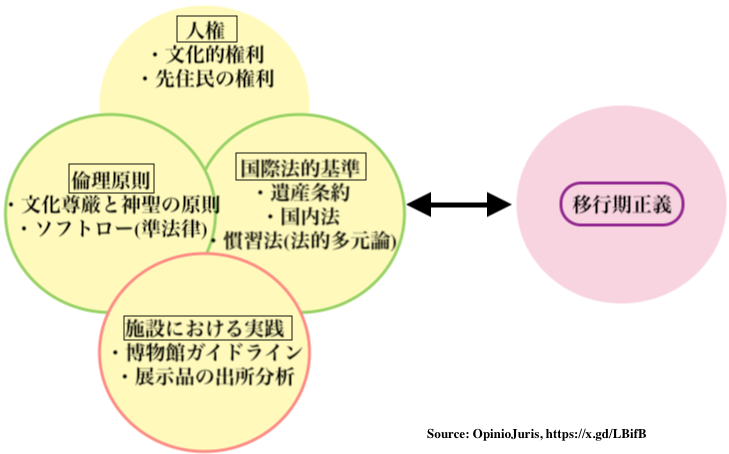
移行期正義を実践する
Transitional Justice in Conflict and Post-Conflict Societies

解 説:池田光穂
★移行期正義(いこうき・せいぎ、Transitional Justice)あるいは移行期司法と は、紛争 (戦争・内戦を含む) 期あるいは紛争後の社会における法の支配において、過去の大規模な人権侵害とその結果に対して折り合いをつける社会の試みの過程と仕組みの総体のことをい う。より簡潔に言えば、紛争が終結した後に、かつての政治指導者や軍事組織の指導者や実行者の審理と処罰について、おこなわれる正義の実践のことである (→「移行期正義/移行期司法」)。
移行期正義に
おいては、以下のような社会的過程がみ
られる:(1)刑事訴追、(2)真実委員会または公聴会の実施、(3)補償、(4)制度改革、(5)公的謝罪、(6)記念物、追悼集会、博物館(出典:http://bit.ly/1G4BkJv)
かつては、内戦合意などの政治的和平交渉のプロセス において、紛争期の戦闘行為に関する責任は包括的に免責するという規定がしばしばみられたが、ここで問題になるのは、さまざまな人権侵害事案である。とり わけ軍隊の中に秘密諜報組織を持つ場合、治安維持の目的でしばしば超法規的処刑がなされており、十分な証拠記録が残されない場合がある。また刑法では法律 不遡及の原則(=法が施行される以前にまで遡って刑の適用を回避する原則)や罪刑法定主義(=犯罪の処罰には予め立法によりその犯罪や行為に対する刑罰を あらかじめ定めなければ罪に問えないルール)があるために、想定もされなかったタイプの人権違反や犯罪を罪に問い難いという法制度上の問題もある。それゆ え、紛争中の(反乱軍事組織を含む)軍の治安維持機能には、必然的に構造 的暴力が生じるゆえんである。
そのために、人道主義の概念に照らし、人権侵害とそ の結果に対して、社会が適正な処罰をおこない、あわせて調停・和解(reconciliation)をおこない、社会が維持する正義の機能を修復しなけれ ばならない——これらを包括して修復的司法(しゅうふくてきしほう, Restorative Justice)と呼ぶ。
| Transitional
justice
is a procedure to respond to massive human rights violations that
implements judicial redress, political reforms in a region or country,
and other measures in order to stop human rights abuse. Transitional
justice consists of judicial and non-judicial measures implemented in
order to redress legacies of human rights abuses. Such measures
"include criminal prosecutions, truth commissions, reparations
programs, and various kinds of institutional reforms". Transitional
justice is enacted at a point of political transition from violence and
repression to societal stability (or at times years later) and it is
informed by a society’s desire to rebuild social trust, reestablish
what is right from what is wrong, repair a fractured justice system,
and build a democratic system of governance. The core value of
transitional justice is the very notion of justice—which does not
necessarily mean criminal justice. This notion and the political
transformation, such as regime change or transition from conflict are
thus linked toward a more peaceful, certain, and democratic future. |
移行期の司法とは、大規模な人権侵害に対応するための手続きであり、人
権侵害をなくすために、司法的救済、地域や国の政治的改革、その他の措置を実施することである。移行期の司法は、人権侵害の負の遺産を是正するために実施
される司法上および非司法上の措置で構成されている。このような措置には「刑事訴追、真実委員会、賠償プログラム、および各種の制度改革が含まれる」。移
行期の司法は、暴力と抑圧から社会の安定へと政治的に移行した時点(あるいはその数年後)に制定され、社会的信頼を回復し、何が正しいのか、何が間違って
いるのかを再確立し、分断された司法制度を修復し、民主的な統治システムを構築したいという社会の願望に基づいている。移行期の司法の核心的価値は(これ
までの固定的な)司法の概念(を柔軟に使うという)そのものにある。移行期世紀の中核的価値は正義そのものにある——この正義は必ずしも刑事司法を意味す
るものでないことは明らかだ(The core value of transitional justice is the very notion
of justice—which does not necessarily mean criminal
justice.)。この概念と、政権交代や紛争からの移行などの政治的変革は、より平和で確実で民主的な未来に向けてつながっている。 |
| Transitional justice in modern
era received greater attention by both academics and policymakers. It
was also widely discussed in political and legal circles, especially in
transitional societies. During political transitions from authoritarian
or dictatorial regimes or from civil conflicts to democracy,
transitional justice has often provided opportunities for such
societies to address past human rights abuses, mass atrocities, or
other forms of severe trauma in order to increase the probability of a
transition into a more democratic or peaceful future. |
現代における移行期の正義は、研究者と政策立案者の両方から大きな注目
を集めている。また、特に移行期にある社会では、政界や法曹界で広く議論されるようになった。権威主義や独裁体制からの政治的移行、あるいは内戦から民主
主義への移行の際には、移行期の司法は、より民主的あるいは平和的な未来への移行の可能性を高めるために、過去の人権侵害や大規模な残虐行為、その他の深
刻なトラウマに対処する機会を当該社会に提供してきた。 |
【問題は「より平和で確実で民主的な未来に向けて《何をもって、そしてどんな根拠を元に》つ
ながっている」か?ということであり、この英語のウィキペディアは説明に止まっていることだ】
https://www.deepl.com/ja/translator の助けを借りた。
★[応用問題]としての遺骨や副葬品の現地社会(先住民社会への返還)について(→「遺骨返還:博物館学芸員の視点」から)

リンク先
文献
Copyleft, CC, Mitzub'ixi Quq Chi'j, 1996-2099





++
Copyleft, CC, Mitzub'ixi Quq Chi'j, 1996-2099
☆
 ☆
☆